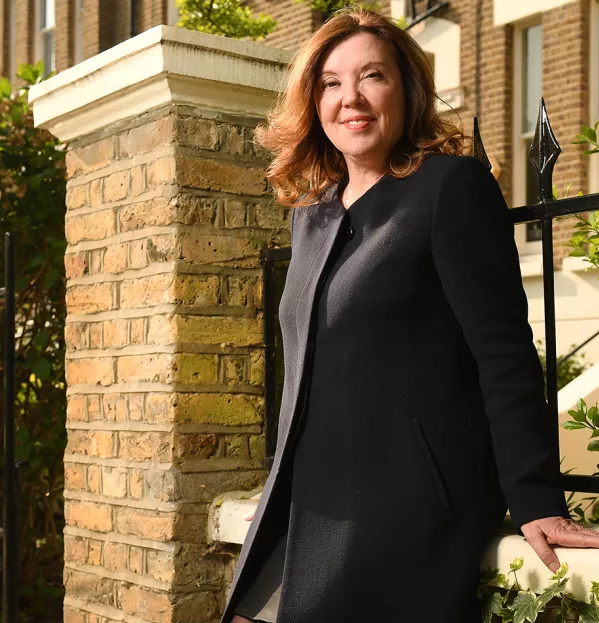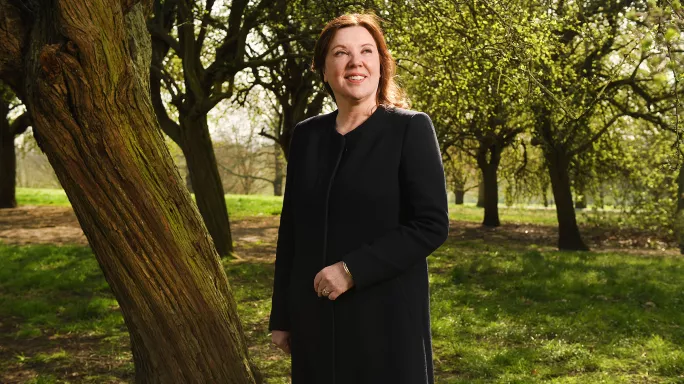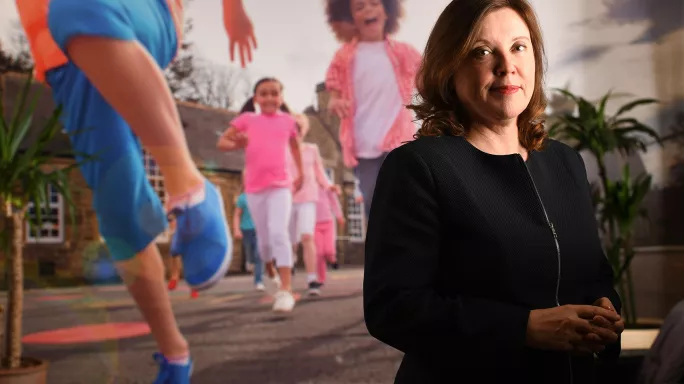- Home
- Leadership
- Strategy
- 10 questions with...Rachel de Souza
10 questions with...Rachel de Souza

Dame Rachel de Souza is the children’s commissioner and former chief executive of Inspiration Trust.
Since being appointed, she has conducted The Big Ask, a national survey of 557,077 young people, to find out their thoughts on schools and their communities. She has also launched a new inquiry into pupil absence to discern the drivers for persistent absence.
She talks to Tes about her own time at school, both as a young person and then as a teacher, and how she sees the future of education moving towards a model where the school is the hub of the community.
1. Who was your most memorable teacher and why?
I had two memorable teachers. One is from my secondary - it was a catholic school and I was taught by nuns; they were real characters.
Sister Anna was my cookery teacher and she used to get cross with me because, although I could cook, I didn’t like cleaning up.
She used said to say to me: “Rachel, you will never get a husband!” I did think at the time that, actually, that would be quite a good thing.
Then, in sixth form, I had a brilliant teacher called Mr Fitzpatrick. He opened up the world to me. He taught me philosophy - and I would walk out of my slightly chaotic teenage life and into his calm classroom, and I really felt the power of education.
It was because of him that I went on to study philosophy at university, and I was the first person to go to university in my family. When I told him I wanted to go to university, he didn’t blink an eyelid and said I should consider Oxford, and I said: “Right, I’ll go there.”
I grew up in Scunthorpe during the miners’ strike and he was one of the only teachers who spoke about the strike with us.
Years later, in my career as a teacher, I held him as my standard. I wanted to teach as well as him, and to have the same impact.
2. What funny memories do you have from school?
When I was in Year 7, I was a studious little girl, and Sister Louis called me in and praised me for my work. She told me she thought I should be head girl one day…and that I should “think about joining us”.
It didn’t occur to me what she actually meant until I left [the room] - she was telling me that she thought I should become a nun! I did consider it, and I took the suggestion very seriously, but I decided it wasn’t for me. And by the time I was 15, it was another Madonna I was following.
3. Why did you choose to work in education?
When I finished university, it was 1989 and everyone told me to train as an accountant or a lawyer.
I got a training contract in accountancy and every day, for the first 10 days, I came home unhappy. I knew it wasn’t right for me and what I really wanted to do was be a teacher.
So I changed and I started teacher training, and the second I stepped into a school, I knew it was right for me.
4. What is your proudest moment?
My first headship was at a Tony Blair-sponsored academy. It was a nearby school that had always been “failing” and then announced it was converting to an academy.
At that time, academies were brand new and I didn’t really know what that meant but it interested me and I wanted to find out more.
I visited the school and knew it was for me. I was really determined to get it, and even though I was only mid thirties and hadn’t been deputy head for very long, against the odds I was appointed.
My proudest moment was the first set of results where we were the most improved school in the country. After years of being at the bottom, we had gone to the top of the table.
The whole community shared in the pride of the transformation and, of course, then I was hooked and wanted to do it again and again.
5. What have been some of your toughest moments?
There have been lots of hard points but the big tough moments have been when it’s been difficult with children - and there are some that still give me nightmares.
One was in my first year of teaching in Stepney. It was a school with many newly arrived migrants, and there was real poverty and it was a difficult time for the community. I felt that something was wrong with one girl in my class - she was quiet and perfectly behaved but with an incredible sadness about her.

I suspected something was wrong - and it transpired that she was essentially being used as a modern slave. She was working in such challenging conditions that she ended up being diagnosed with tuberculosis, and I often question if we should have acted earlier.
Another time was in my first year as an academy principal, and there had been lots of problems with gun violence between two estates near the school. It was pick-up time for the primary school next door, and one of my Year 11 students turned up at the gate with a replica gun and a claw hammer. Armed police arrived and it was very traumatic for everyone involved, and there was a huge fallout.
I had to make a decision about what to do with my Year 11 student, and I excluded him to an institution for him to continue his exams (which he was able to do and got the GCSEs he needed).
I’ll never forget sitting and talking to his mother, and I question whether I did the right thing. His mother’s face haunts me.
6. In your dream school staffroom, who would be your colleagues?
I would have Michael Gove as my head of history and Nick Gibb teaching phonics. I’d have Deanna Troi [from Star Trek: The Next Generation] in charge of pastoral - you would absolutely want an empath in charge of that!
We’d want Shakespeare teaching English. Then brilliant enrichment people for drama and sport. I’d want Marcus Rashford teaching leadership and life skills.
7. In the current school system, what are the best and worst aspects?
The best things about our school system: schools are unrecognisably better compared to when I started working in education. We don’t say “well done” enough to teachers.
I have watched an amazing transformation in schools and we don’t praise teachers enough for that. I think back to when I took on my first school and how low standards were acceptable but, today, as a profession of teachers and as a nation, we find writing kids off intolerable, and that is fantastic.
We have moved forward and come a long way but there is still a lot to do. We need to solve, in a systemic way, a number of things: mental health support, SEND (special educational needs and disability) support where their needs aren’t being met, and children in care.
Support around the child needs focus and development if we’re going to take the education system to where it can be.
8. Who has influenced you most in education?
At different points it has been different people. I was very influenced by Andrew Adonis in the early days of the academy movement; the challenge that came from him - that we should take on the most troubled and failing schools. His belief was that, using expertise from outside - from different sectors of business - we could transform schools.
The “education, education, education” transformation influenced me - the idea of changing the toughest situations possible. The idea that if we applied ourselves, we could take a failing school and we could make sure they got the best education, the same as you could get at any state or private school.
This is a golden thread that runs through my career in education.
9. If you became education secretary, what would you change?
I would sort out attendance. I published a piece recently on issues regarding attendance. Before Covid, it was bad - and it is worse now. I’m really concerned that our data systems aren’t current and it allows our most vulnerable to fall away. And I don’t think that, in the modern world, that is acceptable.
I want to see live data every day, and I would tell my team I want this sorted - children can’t achieve their goals if they’re not in school.
We need to speak to our children and their parents. For The Big Ask [the consultation organised by de Souza in her role as children’s commissioner], I asked what children wanted for their futures and they told me “great jobs and careers”.
I hoped they would tell me they loved learning for the sake of learning but they told me they want great careers.

I would also want more support around the child and to invest in SEND support, mental health support. And I would talk to my opposite number in health and levelling up to work together to create a society where a child could be supported and thrive.
10. What will schools look like in 30 years?
In 30 years, I’ll be 84, and I hope that we will have finally ensured that all children, from whatever background, will be receiving an exceptional education and that the disadvantage gap will have closed.
I hope that we would have cracked STEM (science, technology, engineering and maths) education, particularly for girls.
In 30 years’ time, I would also want to see that we have a fantastic enrichment offer for children, with schools at the centre of their communities, and with brilliant extracurricular activities going on.
To do this, I think the school building should be open all day, with activities on offer that children can develop their interest in. The school building will be a family hub, with services working around schools.
Schools will be the place where expectant mothers get support, and you can go and get advice on getting a job, and also be able to use their fantastic facilities for sport. They will be somewhere that supports the community from birth to career.
Rachel du Souza was talking to senior analyst Grainne Hallahan
You need a Tes subscription to read this article
Subscribe now to read this article and get other subscriber-only content:
- Unlimited access to all Tes magazine content
- Exclusive subscriber-only stories
- Award-winning email newsletters
Already a subscriber? Log in
You need a subscription to read this article
Subscribe now to read this article and get other subscriber-only content, including:
- Unlimited access to all Tes magazine content
- Exclusive subscriber-only stories
- Award-winning email newsletters



